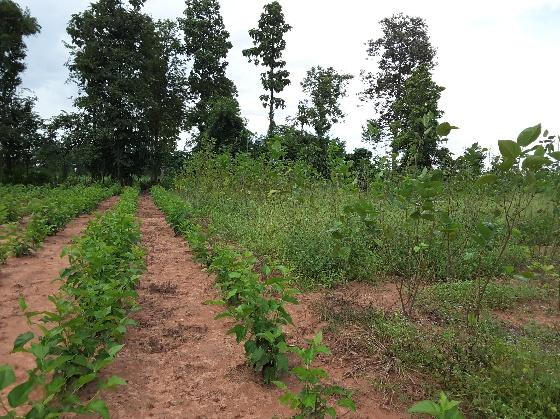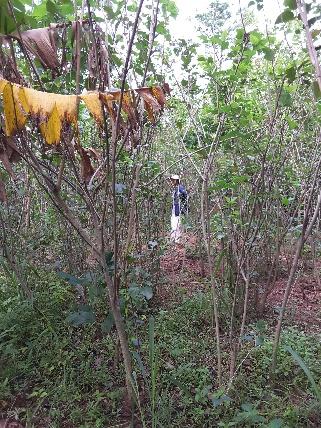The following report from Dennis is just one of a number of projects he is working on in Thailand. Others include coffee growers and coconut farmers... reports on these projects in the pipeline.
You can Contact Dennis from his NZ website: http://nzbiocharltd.co.nz/
Making Biochar from Mulberry Prunings at Khon Kaen, Thailand – June 29th 2018
Dennis Enright (NZ Biochar Ltd)
Mulberry bushes are grown to produce mulberry leaf tea (and for silk worms). During the growing period leaves are regularly picked from the stems and by the end of the growing season most stems are bare of leaves and are about 2-3 metres high. At this time the stems are cut off at about 10 cm from the base, removed, and stacked in piles around the edges of the field until they are dry and can be burnt. The mulberry plant then produces new shoots and the annual cycle continues.


In June of this year GreenNet Cooperative staff and I visited Ban Hin Herb village (Tambon Prayuen, Prayuen District, Khon Kaen) where we used a metal lined Kon-tiki pit kiln to make biochar from Mulberry bush prunings, and then applied some of this biochar to mulberry plants in a simple experiment to evaluate the effects.
I chose a lined Kon-tiki method because on a previous occasion where biochar was made using damp coconut material in a flat bottomed concrete tub, not all the material charred well. This probably happened because in a container with a large flat bottom it is difficult to get a good base of hot char below the newly applied material to help dry it before more charring occurs.
The Kon-tiki pit liner was made at the village using light gauge sheet metal held into shape with wire, both bought locally and costing less than 500 bt in total.
Making biochar with the lined Kon-tiki worked well, even though the prunings were still partially green (about one month old), and the weather was very humid and for a short time near the start of making biochar it rained quite heavily (see photo).
So while there may be other containers that can work, this is the most effective way to make biochar (refer to research work of Schmidt H P and Taylor P)
Also mulberry prunings were easily turned into biochar that was quite soft and had a very noticeable soapy feel to it.
Some of this biochar was then primed with a slurry of chicken manure/rice husks and used in an experiment. The treatments were; 5 litres of primed biochar per plant (place in a circle - diameter of 30 cm), and 5 litres of chicken slurry only.
These treatments were applied to plants in a single row in the following order starting at plant 7 from the road side:
Plant 7 primed biochar, plant 8 no treatment, plant 9 chicken slurry, plant 10 no treatment, Plant 11 primed biochar, plant 12 no treatment, plant 13 chicken slurry, plant 14 no treatment, Plant 15 primed biochar, plant 16 no treatment, plant 17 chicken slurry, plant 18 no treatment (see photos)
The soil here is sand with very low amounts of organic matter. This experiment is situated on an organic farm and we are interested in determining if biochar can increase the effectiveness of nutrients applied in the usual organic fertilisers such as compost that the farmers apply. If treatment effects become apparent, then assessments can be done using a scientifically acceptable visual scoring procedure and the results statistically analysed.




